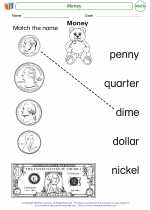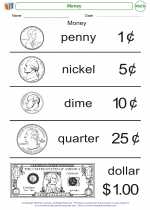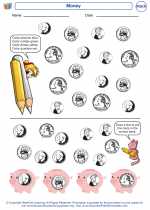Money -> expressions
Expressions
An expression in mathematics is a combination of numbers, symbols, and operators that represents a value. It can contain variables, constants, and arithmetic operations. Expressions are used to describe a mathematical relationship or to calculate a specific value.
Types of Expressions
There are several types of expressions:
- Numeric Expressions: These expressions consist of numbers and arithmetic operations, such as addition, subtraction, multiplication, and division. For example: 5 + 3 * 2
- Variable Expressions: These expressions contain variables, which are symbols that represent unknown or changing values. For example: 2x - 7
- Algebraic Expressions: These expressions combine variables, constants, and arithmetic operations. They often represent real-world situations or mathematical relationships. For example: 3x + 2y - 5
Components of Expressions
Expressions are composed of various components:
- Constants: Fixed values that do not change, such as numbers or numerical values.
- Variables: Symbols that represent unknown or changing values.
- Operators: Symbols that indicate the type of operation to be performed, such as + (addition), - (subtraction), * (multiplication), / (division), and others.
- Exponents: Symbols that indicate raising a number to a power, such as x2 or 34.
- Functions: Mathematical operations that take an input and produce an output, such as sin(x) or log(y).
Evaluating Expressions
To evaluate an expression means to find its value by replacing variables with specific numbers and performing the indicated operations. For example, to evaluate the expression 3x + 2 when x = 4, we substitute 4 for x and calculate the result as 3(4) + 2 = 14.
Understanding expressions is fundamental in mathematics, as they are used in various mathematical concepts, such as algebra, calculus, and geometry.
By mastering expressions, students develop the ability to analyze and solve mathematical problems, as well as to interpret and manipulate mathematical relationships.
Overall, expressions serve as a crucial building block in the study of mathematics, forming the basis for more complex mathematical concepts and problem-solving skills.
That's a brief overview of expressions in mathematics!
[Expressions] Related Worksheets and Study Guides:
.◂Math Worksheets and Study Guides Kindergarten. Money

 Coloring Worksheet
Coloring Worksheet
 Worksheet/Answer key
Worksheet/Answer key
 Worksheet/Answer key
Worksheet/Answer key
 Worksheet/Answer key
Worksheet/Answer key
